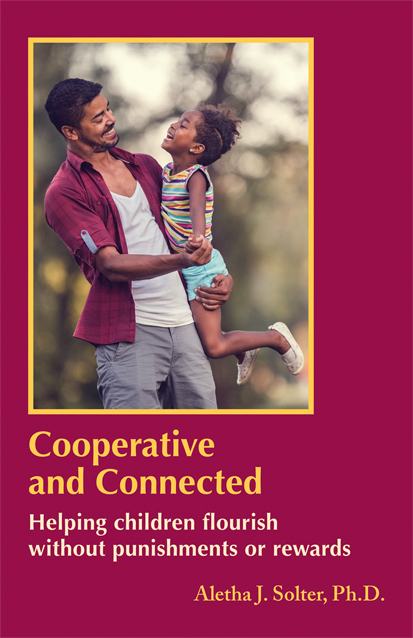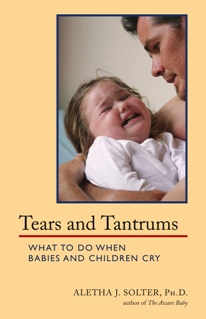Temper tantrums in two-year-old
by Aletha Solter, Ph.D.
Question:
Help!! Our two-year-old daughter has begun to throw almost daily tantrums! She's outgrowing her naps, and I know that is one reason why she's having so many evening breakdowns. Nonetheless, we are becoming EXHAUSTED by her recent and recurrent tantrums. During the tantrum, we ignore her; when we see them coming on, we try to help her through them by encouraging her to use her words (she's very verbal), etc. But I know that the big problem is her lack of a nap, but she won't sleep during the day anymore!
In spite of 30-45 minutes of "quiet time" every day, she is still exhausted come dinner, and a break-down is usually the result. My husband and I have always loved the after-dinner hour when we gave our children (son is 4) baths, spent some quiet one-on-one time with them, and read lots of books. Now we both fall into bed feeling exhausted and overwhelmed after what lately is a night of one or more hours of screaming, crying tantrums from our daughter. Before becoming a mother, I was a high school teacher, and always prided myself on having good boundaries of discipline and strong patience; now I'm questioning all of that. Help!! We've seen our pediatrician about this and he says we're handling the situation "perfectly." Why, then, aren't they stopping? Can I "make" her sleep during the day? How long do these stages usually last? Can you recommend any good books on handling this second year? Please offer any advice you can; we are feeling quite discouraged. Thank you.
Answer:
I do not consider temper tantrums to be "misbehavior," but rather the normal and healthy release of stress and frustration. Research has shown that crying and raging have beneficial effects, helping to release tensions, lower blood pressure, and excrete stress-related chemicals from the body through tears, thereby restoring the body's chemical balance. An interesting survey revealed that healthy adults cry more than those with ulcers. Children should therefore never be punished or discouraged from crying or raging.
Temper tantrums are very common in two-year-olds. You mention that she is no longer napping during the day. Not all two-year-olds need to nap during the day. During the transition to no nap, there is sometimes a period during which young children become very tired in the late afternoon. This does make it harder for them to repress their emotions, and the slightest thing can trigger a tantrum. However, the underlying cause of tantrums is usually accumulated frustrations, fears, and other upsets. So I doubt if the lack of a nap is the underlying cause of her tantrums. If she were tired (and unstressed), she would simply fall sleep without wasting energy crying or screaming. The fact that she cries and rages indicates to me that she has some underlying tensions that she needs to vent.
I recommend, therefore, trying to figure out if there is any new or unusual stress in your daughter's life. Is there a stressful daycare situation for her? Has there been a recent change? Has there been a toilet training struggle? Is there sibling rivalry? Has something frightening happened? It could also be a developmental stage. Two-year-olds need opportunities to do things themselves and make some of their own decisions. They become very frustrated when they are not allowed this autonomy. Perhaps your daughter is becoming frustrated because of attempts to master new skills. Research has shown that increased crying and tantrums often precede the acquisition of new skills. Another possibility is that your daughter is watching too much TV. This can be a source of stress, overstimulation, and fear for young children. (I personally feel that two years of age is too young for any kind of screen-based activities.) Punitive approaches to discipline can also cause tantrums. Surprisingly, so can the use of rewards if the child feels overly controlled. I recommend a non-authoritarian approach without any punishments or rewards. Finally, be sure your daughter has enough quiet, "down" time during the day without too many transitions or structured activities so she doesn't become overstimulated.
However, even with the best of parenting and non-authoritarian approaches to discipline, many children are prone to temper tantrums. This does not imply that you are doing something wrong. Bright, intense, sensitive, and creative children are deeply affected by upsets, changes, and frustrations, even those that we adults might consider to be minor. Their intense emotional reactions are normal. I worry more about children who are quiet and docile and who rarely cry or rage.
When children throw tantrums about insignificant events (for example, you butter the "wrong" side of the bread), they are often using the event as a pretext to do some badly needed crying to release stress. It usually has nothing to do with the event that triggered the screaming and tears. I call this the "broken cookie phenomenon." We adults have "broken cookie" days too. Have you even burst into tears at some minor event when you were already feeling overwhelmed and stressed? This is what children do frequently, and it looks as if they are overreacting or trying to manipulate adults. This is usually not the case. They are simply releasing stress.
Children feel safe to cry and rage when they are confident of being loved and accepted. This is why parents see their children at their "worst!" It implies that the children are feeling safe. Children need at least one person with whom they can release their most intense emotions. It is best if this person can accept the child no matter how she is feeling and not try to stop the crying or tantrum. The more a child can cry and rage at home, the less likely she will be to have emotional outbursts in public.
I recommend staying with your daughter during her tantrums. Get down at her level and give her your loving attention. Hold her if she lets you, but don't insist on it. Don't let her hurt herself or anybody else. Let her know that you understand. Reflect back her feelings ("You are very angry. You've had a hard day.") Let her know that it is okay to cry. She needs the reassurance that she is loved at all times, even when she is sad or angry. Don't try to get her to talk instead of cry. This will not be helpful because language and emotions are processed in different parts of the brain. If she is crying, she needs to cry, and the most useful thing you can do is simply to be with her and show her your love and acceptance. The tantrum will pass, and you will find a much relieved and relaxed little girl who will probably want to snuggle in your arms. Children who have cried and raged as much as needed (with loving support) generally sleep soundly and awaken later bright and alert.
About Aletha Solter
Aletha Solter, PhD, is a developmental psychologist, international speaker, consultant, and founder of the Aware Parenting Institute. Her books have been translated into many languages, and she is recognized internationally as an expert on attachment, trauma, and non-punitive discipline.
Aware Parenting is a philosophy of child-rearing that has the potential to change the world. Based on cutting-edge research and insights in child development, Aware Parenting questions most traditional assumptions about raising children, and proposes a new approach that can profoundly shift a parent's relationship with his or her child. Parents who follow this approach raise children who are bright, compassionate, competent, nonviolent, and drug free.
For more information about temper tantrums, see Aletha Solter's books, Cooperative and Connected and Tears and Tantrums

